上海牛津英语7A Unit5、6知识点及语法重点
牛津7A Unit 5知识点总结梳理
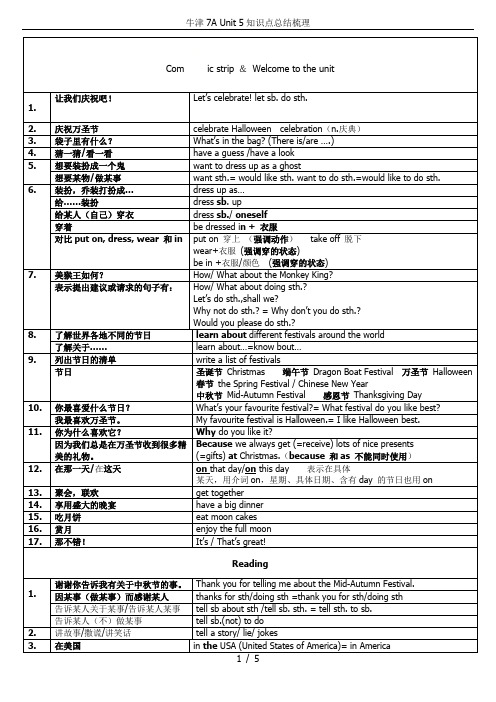
Com ic strip &Welcome to the unit1.让我们庆祝吧!Let’s celebrate! let sb. do sth.2.庆祝万圣节celebrate Halloween celebration(n.庆典)3.袋子里有什么?What’s in the bag? (There is/are ….)4.猜一猜/看一看have a guess /have a look5.想要装扮成一个鬼want to dress up as a ghost想要某物/做某事want sth.= would like sth. want to do sth.=would like to do sth.6.装扮,乔装打扮成…dress up as…给……装扮dress sb. up给某人(自己)穿衣dress sb./ oneself穿着be dressed i n + 衣服对比put on, dress, wear 和in put on 穿上(强调动作)take off 脱下wear+衣服(强调穿的状态)be in +衣服/颜色(强调穿的状态)7.美猴王如何?How/ What about the Monkey King?表示提出建议或请求的句子有:How/ What about doing sth.?Let’s do sth.,shall we?Why not do sth.? = Why don’t you do sth.?Would you please do sth.?8.了解世界各地不同的节日learn about different festivals around the world了解关于……l earn about…=know bout…9.列出节日的清单write a list of festivals节日圣诞节Christmas 端午节Dragon Boat Festival 万圣节Halloween春节the Spring Festival / Chinese New Year中秋节Mid-Autumn Festival 感恩节Thanksgiving Day10.你最喜爱什么节日?What’s your favourite festival?= What festival do you like best?我最喜欢万圣节。
最新上海市牛津英语7A
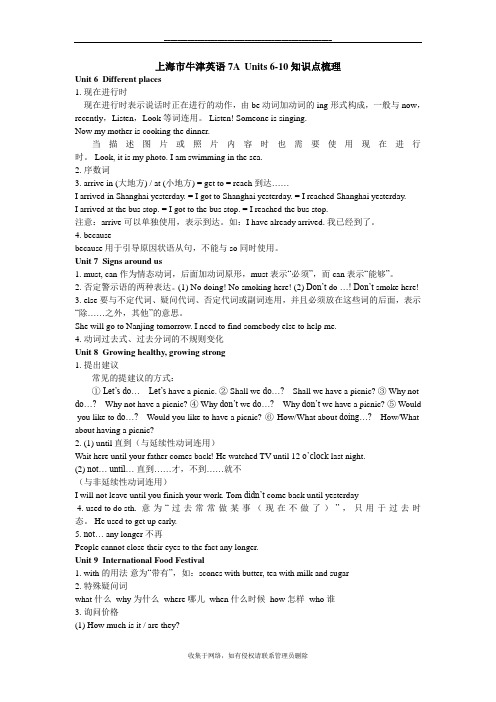
上海市牛津英语7A Units 6-10知识点梳理Unit 6 Different places1. 现在进行时现在进行时表示说话时正在进行的动作,由be动词加动词的ing形式构成,一般与now,recently,Listen,Look等词连用。
Listen! Someone is singing.Now my mother is cooking the dinner.当描述图片或照片内容时也需要使用现在进行时。
Look, it is my photo. I am swimming in the sea.2. 序数词3. arrive in (大地方) / at (小地方) = get to = reach 到达……I arrived in Shanghai yesterday. = I got to Shanghai yesterday. = I reached Shanghai yesterday.I arrived at the bus stop. = I got to the bus stop. = I reached the bus stop.注意:arrive可以单独使用,表示到达。
如:I have already arrived. 我已经到了。
4. becausebecause用于引导原因状语从句,不能与so同时使用。
Unit 7 Signs around us1. must, can作为情态动词,后面加动词原形,must表示“必须”,而can表示“能够”。
2. 否定警示语的两种表达。
(1) No doing! No smoking here! (2) Don’t do …!Don’t smoke here!3. else要与不定代词、疑问代词、否定代词或副词连用,并且必须放在这些词的后面,表示“除……之外,其他”的意思。
She will go to Nanjing tomorrow. I need to find somebody else to help me.4. 动词过去式、过去分词的不规则变化Unit 8 Growing healthy, growing strong1. 提出建议常见的提建议的方式:①Let’s do…Let’s have a picnic. ② Shall we do…? Shall we have a picnic? ③ Why not do…? Why not have a picnic? ④ Why don’t we do…? Why don’t we have a picnic? ⑤ Would you like to do…? Would you like to have a picnic? ⑥ How/What about doing…? How/What about having a picnic?2. (1) until 直到(与延续性动词连用)Wait here until your father comes back! He watched TV until 12 o’clock last night.(2) not…until…直到……才,不到……就不(与非延续性动词连用)I will not leave until you finish your work. Tom didn’t come back until yesterday4. used to do sth. 意为“过去常常做某事(现在不做了)”,只用于过去时态。
上海牛津英语7A_Unit6,7知识点及语法重点
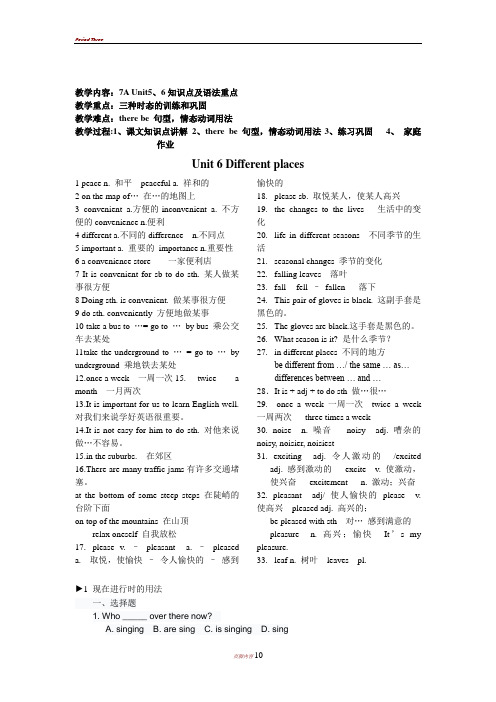
教学内容:7A Unit5、6知识点及语法重点教学重点:三种时态的训练和巩固教学难点:there be 句型,情态动词用法教学过程:1、课文知识点讲解2、there be 句型,情态动词用法3、练习巩固4、家庭作业Unit 6 Different places1 peace n. 和平peaceful a. 祥和的2 on the map of…在…的地图上3 convenient a.方便的inconvenient a. 不方便的convenience n.便利4 different a.不同的difference n.不同点5 important a. 重要的importance n.重要性6 a convenience store 一家便利店7 It is convenient for sb to do sth. 某人做某事很方便8 Doing sth. is convenient. 做某事很方便9 do sth. conveniently 方便地做某事10 take a bus to …= go to …by bus 乘公交车去某处11take the underground to …= go to …by underground 乘地铁去某处12.once a week 一周一次15. twice a month 一月两次13.It is important for us to learn English well. 对我们来说学好英语很重要。
14.It is not easy for him to do sth. 对他来说做…不容易。
15.in the suburbs. 在郊区16.There are many traffic jams有许多交通堵塞。
at the bottom of some steep steps 在陡峭的台阶下面on top of the mountains 在山顶relax oneself 自我放松17. please v. –pleasant a. –pleaseda. 取悦,使愉快–令人愉快的–感到愉快的18. please sb. 取悦某人,使某人高兴19. the changes to the lives 生活中的变化20. life in different seasons 不同季节的生活21. seasonal changes 季节的变化22. falling leaves 落叶23. fall -- fell –fallen 落下24. This pair of gloves is black. 这副手套是黑色的。
七年级英语7A Unit1-Unit5主要知识点复习上海牛津版知识精讲

七年级英语7A Unit1-Unit5主要知识点复习上海牛津版【本讲教育信息】一、教学内容:7A Unit1-Unit5主要知识点复习二、知识总结与归纳Module 1 (Unit 1- Unit 3)1. invite sb. to do邀请某人做某事He has invited us to stay with his family in Beijing.他已经邀请我们去北京和他的家人呆在一起。
2. travel to 旅行去……We usually travel to some small cities.我们经常去一些小城市旅游。
3. more interesting 更加有趣more beautiful 更加美丽more exciting 更加激动人心4. talk to 和……谈话Let’s talk to Mum and Kitty.让我们去和妈妈还有基蒂谈谈。
5. travel agent 旅行经纪人I’ll get some brochures from the travel agent.我会从旅行经纪人那里拿到一些宣传手册。
6. How long does it take to…? ……花费多少时间?It takes (time) to do ………花费(时间)How long does it take to get to Beijing?到北京花费多少时间?It takes about 2 and a half hours to get there.到北京大概要花费两个半小时。
7. come back 回来We’re going to come back at 8.我们将会在8点回来。
8. at the end of (August) 在(八月)底We will start school at the end of August.我们将会在八月底开学。
9. thank sb. for 为……谢某人Thank you for your water. 谢谢你的水。
最新上海牛津英语7A-Unit6-7知识点及语法重点资料
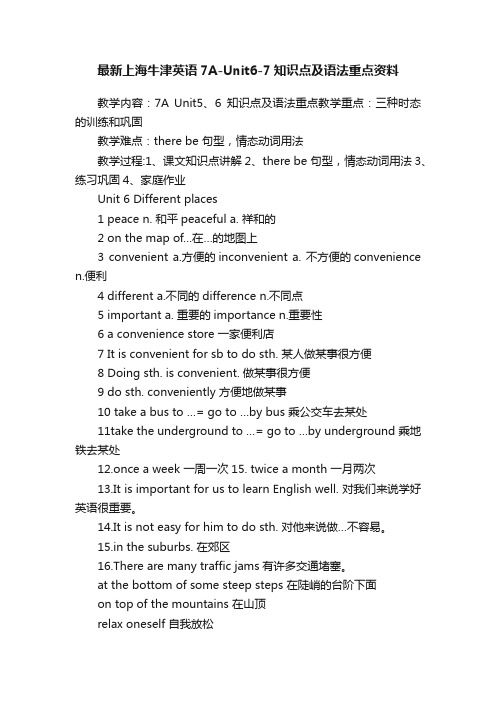
最新上海牛津英语7A-Unit6-7知识点及语法重点资料教学内容:7A Unit5、6知识点及语法重点教学重点:三种时态的训练和巩固教学难点:there be 句型,情态动词用法教学过程:1、课文知识点讲解2、there be 句型,情态动词用法3、练习巩固4、家庭作业Unit 6 Different places1 peace n. 和平peaceful a. 祥和的2 on the map of…在…的地图上3 convenient a.方便的inconvenient a. 不方便的convenience n.便利4 different a.不同的difference n.不同点5 important a. 重要的importance n.重要性6 a convenience store 一家便利店7 It is convenient for sb to do sth. 某人做某事很方便8 Doing sth. is convenient. 做某事很方便9 do sth. conveniently 方便地做某事10 take a bus to …= go to …by bus 乘公交车去某处11take the underground to …= go to …by underground 乘地铁去某处12.once a week 一周一次15. twice a month 一月两次13.It is important for us to learn English well. 对我们来说学好英语很重要。
14.It is not easy for him to do sth. 对他来说做…不容易。
15.in the suburbs. 在郊区16.There are many traffic jams有许多交通堵塞。
at the bottom of some steep steps 在陡峭的台阶下面on top of the mountains 在山顶relax oneself 自我放松17. please v. –pleasant a. –pleaseda. 取悦,使愉快–令人愉快的–感到愉快的18. please sb. 取悦某人,使某人高兴19. the changes to the lives 生活中的变化20. life in different seasons 不同季节的生活21. seasonal changes 季节的变化22. falling leaves 落叶23. fall -- fell –fallen 落下24. This pair of gloves is black. 这副手套是黑色的。
上海牛津英语7A_Unit6,7知识点及语法重点(精品资料).doc

【最新整理,下载后即可编辑】教学内容:7A Unit5、6知识点及语法重点教学重点:三种时态的训练和巩固教学难点:there be 句型,情态动词用法教学过程:1、课文知识点讲解2、there be 句型,情态动词用法3、练习巩固4、家庭作业Unit 6 Different places1 peace n. 和平peaceful a. 祥和的2 on the map of…在…的地图上3 convenient a.方便的inconvenient a. 不方便的convenience n.便利4 different a.不同的difference n.不同点5 important a. 重要的importance n.重要性6 a convenience store 一家便利店7 It is convenient for sb to do sth. 某人做某事很方便8 Doing sth. is convenient. 做某事很方便9 do sth. conveniently 方便地做某事10 take a bus to …= go to …by bus 乘公交车去某处11take the underground to …= go to …by underground 乘地铁去某处12.once a week 一周一次15.twice a month 一月两次13.It is important for us to learn English well. 对我们来说学好英语很重要。
14.It is not easy for him to do sth. 对他来说做…不容易。
15.in the suburbs. 在郊区16.There are many traffic jams有许多交通堵塞。
at the bottom of some steep steps 在陡峭的台阶下面on top of the mountains 在山顶relax oneself 自我放松17. please v. –pleasant a. –pleased a. 取悦,使愉快–令人愉快的–感到愉快的18. please sb. 取悦某人,使某人高兴19. the changes to the lives 生活中的变化20. life in different seasons 不同季节的生活21. seasonal changes 季节的变化22. falling leaves 落叶23. fall -- fell –fallen 落下24. This pair of gloves is black. 这副手套是黑色的。
沪教版英语7A u5-U6单元总结
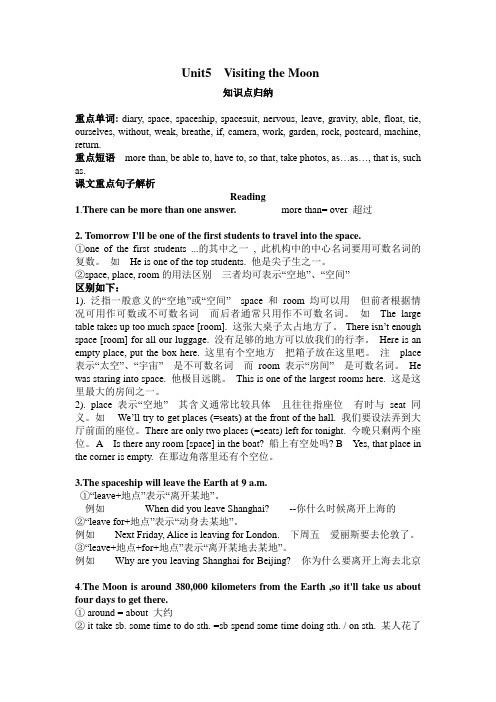
Unit5 Visiting the Moon知识点归纳重点单词: diary, space, spaceship, spacesuit, nervous, leave, gravity, able, float, tie, ourselves, without, weak, breathe, if, camera, work, garden, rock, postcard, machine, return.重点短语, take photos, as…as…, that is, such as.课文重点句子解析Reading1.There can be more than one answer. more than= over 超过2. Tomorrow I'll be one of the first students to travel into the space.①one of the first students ...的其中之一, 此机构中的中心名词要用可数名词的复数。
如他是尖子生之一。
②space, place, room的用法区别三者均可表示“空地”、“空间区别如下:1). 泛指一般意义的“空地”或“空间和room 均可以用但前者根据情况可用作可数或不可数名词而后者通常只用作不可数名词。
如takes up too much space [room]. 这张大桌子太占地方了。
There isn’t enough space [room] for all our luggage. 没有足够的地方可以放我们的行李。
Here is an empty place, put the box here. 这里有个空地方把箱子放在这里吧。
注表示“太空”、“宇宙是不可数名词而room 表示“房间是可数名词。
He was staring into space. 他极目远眺。
This is one of the largest rooms here. 这是这里最大的房间之一。
最新上海牛津英语7A-Unit6-7知识点及语法重点资料
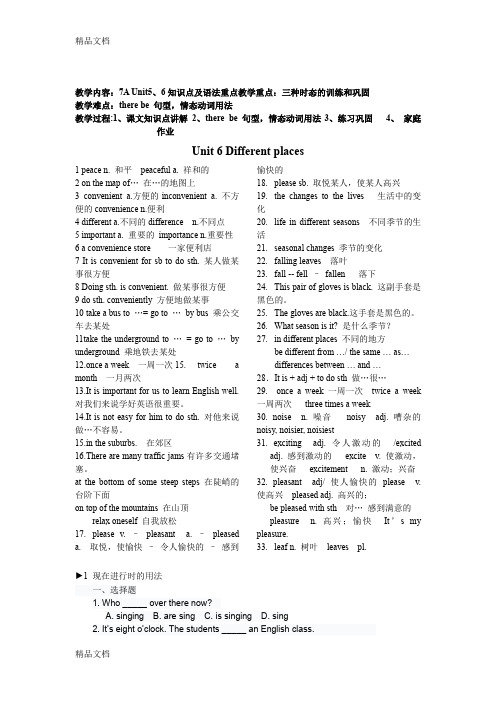
教学内容:7A Unit5、6知识点及语法重点教学重点:三种时态的训练和巩固教学难点:there be 句型,情态动词用法教学过程:1、课文知识点讲解2、there be 句型,情态动词用法3、练习巩固4、家庭作业Unit 6 Different places1 peace n. 和平peaceful a. 祥和的2 on the map of…在…的地图上3 convenient a.方便的inconvenient a. 不方便的convenience n.便利4 different a.不同的difference n.不同点5 important a. 重要的importance n.重要性6 a convenience store 一家便利店7 It is convenient for sb to do sth. 某人做某事很方便8 Doing sth. is convenient. 做某事很方便9 do sth. conveniently 方便地做某事10 take a bus to …= go to …by bus 乘公交车去某处11take the underground to …= go to …by underground 乘地铁去某处12.once a week 一周一次15. twice a month 一月两次13.It is important for us to learn English well. 对我们来说学好英语很重要。
14.It is not easy for him to do sth. 对他来说做…不容易。
15.in the suburbs. 在郊区16.There are many traffic jams有许多交通堵塞。
at the bottom of some steep steps 在陡峭的台阶下面on top of the mountains 在山顶relax oneself 自我放松17. please v. –pleasant a. –pleaseda. 取悦,使愉快–令人愉快的–感到愉快的18. please sb. 取悦某人,使某人高兴19. the changes to the lives 生活中的变化20. life in different seasons 不同季节的生活21. seasonal changes 季节的变化22. falling leaves 落叶23. fall -- fell –fallen 落下24. This pair of gloves is black. 这副手套是黑色的。
新牛津英语译林版7A各单元词汇及重点句型一览表

新牛津英语译林版7A各单元词汇及重点句型一览表Unit1 This is me.单词:1 oh /əʊ/ excl. 哦,啊2 e—dog /'i:dɒɡ/ n. 电子狗3 master /'mɑ:stə(r)/ n。
主人4 grade /ɡreɪd/ n. 年级5 student /ˈstju:dnt/n. 学生6 reading /’ri:dɪŋ/n。
阅读7 classmate /ˈklɑ:smeɪt/ n. 同班同学8 afterschool /ˈɑ:ftə sku:l/ 放学后9 slim /slɪm/ adj. 苗条的10 be good at /bi: ɡud æt/ 擅长于11 over there /’əʊvə(r) / /ðεə/ 在那边12 classroom /ˈklɑ:sru:m/ n。
教室13 dancing /'dɑ:nsɪŋ/n。
跳舞,舞蹈14 swimming /ˈswɪmɪŋ/n. 游泳15 age /eɪdʒ/ n。
年龄16 looks /lʊks/ n。
相貌,容貌17 cute /kju:t/ adj. 可爱的;讨人喜欢的18 hobby /'hɒbɪ/ n。
业余爱好19 glad /ɡlæd/ adj. 高兴地20 everyone /ˈevriwʌn/ pron.每人,人人21 comefrom /kʌm frɔm/ 来自22 glasses /’glɑ:sɪz/ n. 【复】眼镜句型:1.How to look after your e-dog.如何照顾你的电子狗。
2.I have short hair。
= My hair is short.我短发。
3.Let's meet my new classmates.让我们见见我的新同学。
4.She is tall and slim。
她高而苗条。
牛津英语7A 第5单元知识点
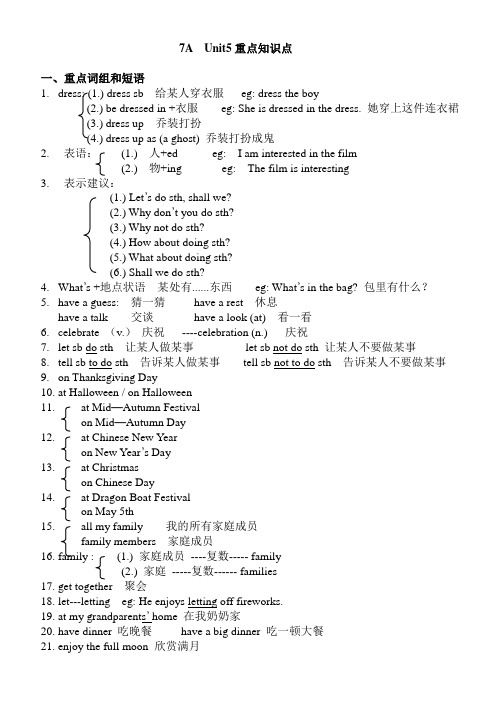
7A Unit5重点知识点一、重点词组和短语1.dress: (1.) dress sb 给某人穿衣服eg: dress the boy(2.) be dressed in +衣服eg: She is dressed in the dress. 她穿上这件连衣裙(3.) dress up 乔装打扮(4.) dress up as (a ghost) 乔装打扮成鬼2.表语:(1.) 人+ed eg: I am interested in the film(2.) 物+ing eg: The film is interesting3.表示建议:(1.) Let’s do sth, shall we?(2.) Why don’t you do sth?(3.) Why not do sth?(4.) How about doing sth?(5.) What about doing sth?(6.) Shall we do sth?4.What’s +地点状语某处有......东西eg: What’s in the bag? 包里有什么?5.have a guess: 猜一猜have a rest 休息have a talk 交谈have a look (at) 看一看6.celebrate (v.)庆祝----celebration (n.) 庆祝7.let sb do sth 让某人做某事let sb not do sth 让某人不要做某事8.tell sb to do sth 告诉某人做某事tell sb not to do sth 告诉某人不要做某事9.on Thanksgiving Day10.at Halloween / on Halloween11. at Mid—Autumn Festivalon Mid—Autumn Day12.at Chinese New Yearon New Year’s Day13.at Christmason Chinese Day14.at Dragon Boat Festivalon May 5th15.all my family 我的所有家庭成员family members 家庭成员16.family : (1.) 家庭成员----复数----- family(2.) 家庭-----复数------ families17.get together 聚会18.let---letting eg: He enjoys letting off fireworks.19.at my grandparents’ home 在我奶奶家20.have dinner 吃晚餐have a big dinner 吃一顿大餐21.enjoy the full moon 欣赏满月22.full: (1.)满的,充满的----empty 空的be full of / be filled with 充满......eg: The basket is full of flowers. / The basket is filled with flowers.(2.)饱的-----hungry23.because 与so 在一个主从复合句中,只能用其中一个。
牛津7AUnit6知识梳理
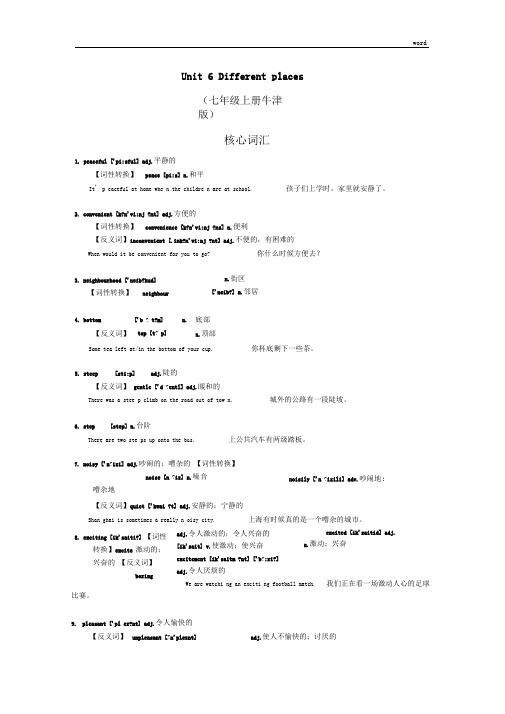
adj.令人激动的;令人兴奋的 [ik'sait] v.使激动;使兴奋 excitement [ik'saitm ?nt] ['b ?:ri?] adj.令人厌烦的excited [ik'saitid] adj.n.激动;兴奋We are watchi ng an exciti ng football match.我们正在看一场激动人心的足球比赛。
9. pleasant ['pl ez?nt] adj.令人愉快的【反义词】 unpleasant [?n'pleznt] adj.使人不愉快的;讨厌的Unit 6 Different places(七年级上册牛津版)核心词汇1. peaceful ['pi:sful] adj.平静的 【词性转换】 peace [pi:s] n.和平 It ' p eaceful at home whe n the childre n are at school. 孩子们上学时,家里就安静了。
2. convenient [k?n'vi:nj ?nt] adj.方便的 【词性转换】 convenience [k?n'vi:nj ?ns] n.便利 【反义词】inconvenient [.ink?n'vi:nj ?nt] adj.不便的,有困难的When would it be convenient for you to go? 你什么时候方便去? 3. neighbourhood ['neib?hud] 【词性转换】 neighbourn.街区 ['neib?] n.邻居 ['b ? t?m] n. top [t ? p] 底部 n.顶部 4. bottom 【反义词】 Some tea left at/in the bottom of your cup. 你杯底剩下一些茶。
上海牛津英语7A-Unit4、5知识点及语法重点

教学内容:7A Unit4、5知识点及语法重点(现在完成时)教学重点:三种时态的训练和巩固教学难点:现在完成时—瞬间动词与延续性动词的转换教学过程:1、课文知识点讲解2、时态练习3、练习巩固4、家庭作业1. 用there be句型表示客观存在(就近原则)2.现在完成时(一)含义现在完成时用来表示现在之前已发生或完成的动作或状态,但其结果却和现在有联系, 也就是说, 动作或状态发生在过去但它的影响现在还存在。
e.g. I have lost my wallet. (含义是:现在我没有钱花了。
)Jane has laid the table.(含义是:已可以吃饭了。
)Michael has been ill.(含义是:现在仍然很虚弱。
)He has returned from abroad. (含义是:现在已在此地)(二)结构助动词have /has+动词过去分词,主语为第三人称单数用has,其他人称用have 。
(三)句型1、肯定句:主语+have /has+动词过去分词+其他。
I have studied English for 5 years .2、否定句:主语+have /has+not +动词过去分词+其他。
We haven’t been there .3、一般疑问句:Have/Has+主语+动词过去分词+其他?Has he eaten that apple ?4、特殊疑问句:特殊疑问词+ have /has +主语+动词过去分词+其他?(四)用法1、现在完成时可以用来表示发生在过去某一时刻的、持续到现在的情况,常与for, since连用。
e.g. Mary has been ill for three days.I have lived here since 1998.2、现在完成时往往同表示不确定的过去时间状语连用, 如already, yet, just, before, recently, lately等:e.g. He has already obtained a scholarship.I haven’t seen much of him re cently (lately).We have seen that film before.Have they found the missing child yet?3、现在完成时常常与表示频度的时间状语连用e.g. Have you ever been to Beijing?I have never heard Bunny say anything against her.I have used this pen only three times. It is still good.George has met that gentleman on several occasions.4、现在完成时还往往可以同包括现在时间在内的时间状语连用,如now, up to these few days/weeks/months/years, this morning/week/month/year, now, just, today, up to present, so far等。
七年级上英语知识梳理(上海牛津版)U5-U6
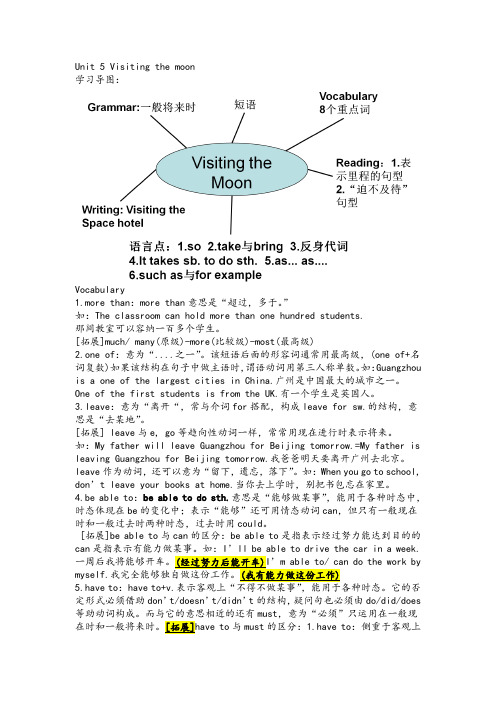
Unit 5 Visiting the moon学习导图:Vocabulary1.more than:more than意思是“超过,多于。
”如:The classroom can hold more than one hundred students.那间教室可以容纳一百多个学生。
[拓展]much/ many(原级)-more(比较级)-most(最高级)2.one of:意为“....之一”。
该短语后面的形容词通常用最高级,(one of+名词复数)如果该结构在句子中做主语时,谓语动词用第三人称单数。
如:Guangzhou is a one of the largest cities in China.广州是中国最大的城市之一。
One of the first students is from the UK.有一个学生是英国人。
3.leave:意为“离开“,常与介词for搭配,构成leave for sw.的结构,意思是“去某地”。
[拓展] leave与e, go等趋向性动词一样,常常用现在进行时表示将来。
如:My father will leave Guangzhou for Beijing tomorrow.=My father is leaving Guangzhou for Beijing tomorrow.我爸爸明天要离开广州去北京。
leave作为动词,还可以意为“留下,遗忘,落下”。
如:When you go to school, don’t leave your books at home.当你去上学时,别把书包忘在家里。
4.be able to:be able to do sth.意思是“能够做某事”,能用于各种时态中,时态体现在be的变化中;表示“能够”还可用情态动词can,但只有一般现在时和一般过去时两种时态,过去时用could。
[拓展]be able to与can的区分:be able to是指表示经过努力能达到目的的canmyself.5.have to:have定形式必须借助don’t/doesn’t/didn’t的结构,疑问句也必须由do/did/doesmust,意为“必须”只运用在一般现与must的区分:1.have to:侧重于客观上的必须。
_Unit 5重点知识点梳理 2021-2022学年牛津译林版英语七年级上册
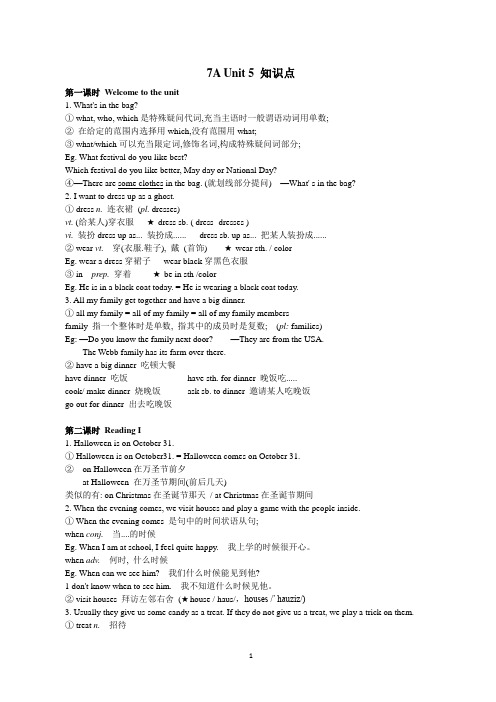
7A Unit 5 知识点第一课时Welcome to the unit1. What's in the bag?① what, who, which是特殊疑问代词,充当主语时一般谓语动词用单数;②在给定的范围内选择用which,没有范围用what;③ what/which可以充当限定词,修饰名词,构成特殊疑问词部分;Eg. What festival do you like best?Which festival do you like better, May day or National Day?④—There are some clothes in the bag. (就划线部分提问) —What' s in the bag?2. I want to dress up as a ghost.① dress n.连衣裙(pl. dresses)vt. (给某人)穿衣服★ dress sb. ( dress- dresses )vi.装扮dress up as... 装扮成...... dress sb. up as... 把某人装扮成......② wear vt. 穿(衣服.鞋子), 戴(首饰) ★ wear sth. / colorEg. wear a dress穿裙子wear black穿黑色衣服③ in prep. 穿着★ be in sth /colorEg. He is in a black coat today. = He is wearing a black coat today.3. All my family get together and have a big dinner.① all my family = all of my family = all of my family membersfamily 指一个整体时是单数, 指其中的成员时是复数; (pl: families)Eg: —Do you know the family next door? —They are from the USA.The Webb family has its farm over there.② have a big dinner 吃顿大餐have dinner 吃饭have sth. for dinner 晚饭吃.....cook/ make dinner 烧晚饭ask sb. to dinner 邀请某人吃晚饭go out for dinner 出去吃晚饭第二课时Reading I1. Halloween is on October 31.① Halloween is on October31. = Halloween comes on October 31.②on Halloween在万圣节前夕at Halloween 在万圣节期间(前后几天)类似的有: on Christmas在圣诞节那天/ at Christmas在圣诞节期间2. When the evening comes, we visit houses and play a game with the people inside.① When the evening comes 是句中的时间状语从句;when conj. 当....的时候Eg. When I am at school, I feel quite happy. 我上学的时候很开心。
牛津译林版七年级英语上册7A Unit5-6知识点归纳总结
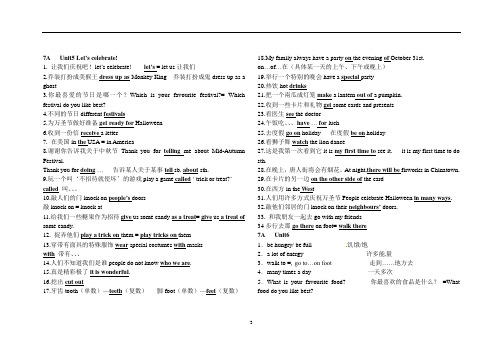
7A Unit5 Let’s celebrate!1. 让我们庆祝吧!let’s celebrate! let’s = let us让我们2.乔装打扮成美猴王dress up as Monkey King 乔装打扮成鬼dress up as a ghost3.你最喜爱的节日是哪一个?Which is your favourite festival?= Which festival do you like best?4.不同的节日different festivals5.为万圣节做好准备get ready for Halloween6.收到一份信receive a letter7. 在美国in the USA = in America8.谢谢你告诉我关于中秋节Thank you for telling me about Mid-Autumn Festival.Thank you for doing…告诉某人关于某事tell sb. about sth.9.玩一个叫‘不招待就使坏’的游戏play a game called‘ trick or treat?’called叫、、、10.敲人们的门knock on people’s doors敲knock on = knock at11.给我们一些糖果作为招待give us some candy as a treat= give us a treat of some candy.12. 捉弄他们play a trick on them = play tricks on them13.穿带有面具的特殊服饰wear special costumes with maskswith带有、、、14.人们不知道我们是谁people do not know who we are.15.真是精彩极了it is wonderful.16.挖出cut out17.牙齿tooth(单数)—teeth(复数)脚foot(单数)—feet(复数)18.My family always have a party on the evening of October 31st. on…of…在(具体某一天的上午、下午或晚上)19.举行一个特别的晚会have a special party20.热饮hot drinks21.把一个南瓜成灯笼make a lantern out of a pumpkin.22.收到一些卡片和礼物get some cards and presents23.看医生see the doctor24.午饭吃、、、have… for luch25.去度假go on holiday 在度假be on holiday26.看狮子舞watch the lion dance27.这是我第一次看到它it is my first time to see it. it is my first time to do sth.28.在晚上,唐人街将会有烟花。
牛津上海七年级上册Unit5 Choosing a new flat知识点及语法点讲解
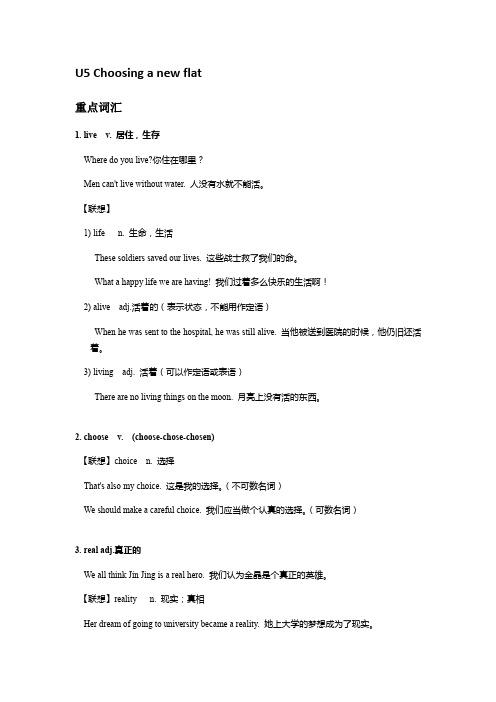
U5 Choosing a new flat重点词汇1. live v. 居住,生存Where do you live?你住在哪里?Men can't live without water. 人没有水就不能活。
【联想】1) life n. 生命,生活These soldiers saved our lives. 这些战士救了我们的命。
What a happy life we are having! 我们过着多么快乐的生活啊!2) alive adj.活着的(表示状态,不能用作定语)When he was sent to the hospital, he was still alive. 当他被送到医院的时候,他仍旧还活着。
3) living adj. 活着(可以作定语或表语)There are no living things on the moon. 月亮上没有活的东西。
2. choose v. (choose-chose-chosen)【联想】choice n. 选择That's also my choice. 这是我的选择。
(不可数名词)We should make a careful choice. 我们应当做个认真的选择。
(可数名词)3. real adj.真正的We all think Jin Jing is a real hero. 我们认为金晶是个真正的英雄。
【联想】reality n. 现实;真相Her dream of going to university became a reality. 她上大学的梦想成为了现实。
4. complete1)v. 完成The workers haven't completed the house yet. 工人们还没有造好那所房子。
2) adj.完全的,完整的He's a complete stranger to me. 我和他完全不认识。
7AUnit5知识点(上海教育出版社)

7A Unit51.how far多远—How far is it from your home to school?—It’s about 200 meters from my home to school.2.on 介词,表示在具体某一天或在具体某一天的上午、下午和晚上He was born on February 7th, 1991.They ustually play football on Tuesday afternoon.3.in 在,用于泛指在上午、下午、晚上及在某年、某月、某季节等。
We have four classes in the morning and two in the afternoon.She often watches TV in the evening.4.the定冠词,特指世界上独一无二的事物。
1)特指谈话双方都知道的人或物。
Near the hospital you’ll see the shop.Do you know the boy over there?2)指上文提到过的人或事物。
上文出现的名词前用a/an,再次或多次出现时常用the。
I have a book. The book is new.3)用在作定语的序数词之前。
I didn’t take the first bus.5.more than超过;多于She has no more than one sister.I have more than fifty books.more… than比……更,其中more可修饰名词、形容词、副词。
Joan is more clever than John.I am more sorry than angry.He earns more money than he can spend.6.nervous adj.紧张的,常作表语。
She feels a little nervous.I makes him nervous to speak loudly.7.leave v.离开leave for动身去The train leaves the station at 5:30.They will leave for Chongqing.leave v.留下;剩下Leave that work for another day.When you go to school, don’t leave your books at home.8.at在,表示某一具体的时刻。
牛津英语 7A Unit 5 单词、短语、句型总结

Unit 5Ⅰ. 基本词汇1. 庆祝celebrate2. 猜,猜测guess3. 穿着,穿衣dress4. 作为,当作as5. 鬼,鬼魂ghost6. 节日festival7. 因为because 8. 礼物present 9. 满的,圆的full10. 在一起,共同together 11. 月饼moon cake 12. 圣诞节Christmas 13. 用颜料涂paint 14. 南瓜pumpkin 15. 灯笼,提灯lantern 16. 在里面inside 17. 敲,击knock 18. 大声说,叫,嚷shout 19. 如果if 20. 特殊的,特别的special 21. 面具,面罩mask22. 美国USA 23. 招待treat 24. 诡计、把戏trick25. 问题question 26. 汤团,饺子dumpling 27. 另外,其他other28. 祖父(母)grandparent 29. 东西;事情;物品thing 30. 狮子lion31. 烟火,烟花firework 32. 更多;更加more 33. 演出,秀show34. 无线电广播(节目);收音机radio 35. 好像,似乎,看来seem36. 不同的different 37. 围绕,在……周围around 38. 重要的important 39. 离开,脱离off 40. 小包;(一)包packet 41. 大多数,大部分most Ⅱ. 英汉互译1. 装扮,乔装打扮dress up2. 装扮成dress up as3. 全世界around the world 5. 感恩节Thanksgiving Day5. 春节(2种)Chinese New Year =Spring Festival6. 端午节Dragon Boat Festival7. 美猴王Monkey King8. 中秋节Mid-Autumn Festival 9. 在圣诞节at Christmas10. 在那一天on that day 11. 聚会,联欢get together12. 举行盛大的晚宴have a big dinner 13. 吃月饼eat moon cakes14. 欣赏满月enjoy the full moon 15. 告诉某人关于…tell sb. about …16. 在美国in the USA 17. 在10月31日on October 31 18. 最喜欢万圣节like Halloween best 19. 戴面具wear masks20. 做南瓜灯make pumpkin lanterns 21. 做游戏play a game22. 敲门knock on the door 23. 举行一次聚会have a party24. 不招待,就使坏trick or treat 25. 捉弄……play a trick on…26. 用糖果招待某人give sb. some candy as a treat27. 在10月31日的晚上on the evening of October 3128. 特别的一天 a special day29. 对某人来说很有趣be much fun for sb.30. 用……做灯笼make lanterns out of…31. 在万圣节on Halloween 32. 红色的这个the/this red one133. 在七月二日on 2 July 34. 给某人be for sb.35. 那个穿红外衣的女孩that girl in a red coat36. 家庭成员family members 37. 在八月一日on 1 August38. 在我家附近的一家餐馆at a restaurant near my home39. 生日礼物birthday presents 40. 春节聚会Chinese New Year Party 41. 狮子舞lion dance 42. 音乐和舞蹈music and dance 43. 发现;查明find out 44. 春节快乐Happy New Year45. 在度假be on holiday 46. 举行表演have (the)shows46. 许多有趣的事lots of interesting things47. 拍摄许多照片take a lot of photos48. 庆祝春节celebrate the Chinese New Year49. 度过愉快的一天have a nice day 50. 在夜里at night51. 一个重要的节日(假期)an important holiday52. 家庭成员聚集在一起family members get together53. 真精彩really wonderful 54. 放烟火let off fireworks55. 总是在一月或二月be always in January or February56. 收到礼品get presents 57. 春节晚会Spring Festival Gala58. 一年的这个时候at this time of year59. 为……做准备get/be ready for 60. 红包red packets61. 使(炸弹等)爆炸let off =set offⅢ. 基本句型1. 因为我们在圣诞节总是收到许多好礼物。
- 1、下载文档前请自行甄别文档内容的完整性,平台不提供额外的编辑、内容补充、找答案等附加服务。
- 2、"仅部分预览"的文档,不可在线预览部分如存在完整性等问题,可反馈申请退款(可完整预览的文档不适用该条件!)。
- 3、如文档侵犯您的权益,请联系客服反馈,我们会尽快为您处理(人工客服工作时间:9:00-18:30)。
教学内容:7A Unit5、6知识点及语法重点教学重点:三种时态的训练和巩固教学难点:there be 句型,情态动词用法教学过程:1、课文知识点讲解2、there be 句型,情态动词用法3、练习巩固4、家庭作业Unit 6 Different places1 peace n. 和平peaceful a. 祥和的2 on the map of…在…的地图上3 convenient a.方便的inconvenient a. 不方便的convenience n.便利4 different a.不同的difference n.不同点5 important a. 重要的importance n.重要性6 a convenience store 一家便利店7 It is convenient for sb to do sth. 某人做某事很方便8 Doing sth. is convenient. 做某事很方便9 do sth. conveniently 方便地做某事10 take a bus to …= go to …by bus 乘公交车去某处11take the underground to …= go to …by underground 乘地铁去某处12.once a week 一周一次15. twice a month 一月两次13.It is important for us to learn English well. 对我们来说学好英语很重要。
14.It is not easy for him to do sth. 对他来说做…不容易。
15.in the suburbs. 在郊区16.There are many traffic jams有许多交通堵塞。
at the bottom of some steep steps 在陡峭的台阶下面on top of the mountains 在山顶relax oneself 自我放松17. please v. –pleasant a. –pleaseda. 取悦,使愉快–令人愉快的–感到愉快的18. please sb. 取悦某人,使某人高兴19. the changes to the lives 生活中的变化20. life in different seasons 不同季节的生活21. seasonal changes 季节的变化22. falling leaves 落叶23. fall -- fell –fallen 落下24. This pair of gloves is black. 这副手套是黑色的。
25. The gloves are black.这手套是黑色的。
26. What season is it? 是什么季节?27. in different places 不同的地方be diffe rent from …/ the same … as…differences between … and …28.It is + adj + to do sth 做…很…29. once a week 一周一次twice a week 一周两次three times a week30. noise n. 噪音noisy adj. 嘈杂的noisy, noisier, noisiest31. exciting adj. 令人激动的/excitedadj. 感到激动的excite v. 使激动,使兴奋excitement n. 激动;兴奋32. pleasant adj/ 使人愉快的please v. 使高兴pleased adj. 高兴的;be pleased with sth 对…感到满意的pleasure n. 高兴;愉快It’s my pleasure.33. leaf n. 树叶leaves pl.►1 现在进行时的用法一、选择题1. Who _____ over there now?A. singingB. are singC. is singingD. sing2. It’s eight o’clock. The students _____ an English class.A. haveB. havingC. is havingD. are having3. Listen! The baby _____ in the next room.A. cryingB. criedC. is cryingD. cries4. Look! The twins _____ new sweaters.A. are wearingB. wearingC. are wearD. is wearing5. Don’t talk here. Grandparents _____.A. is sleepingB. are sleepingC. sleepingD. sleep6. Tom is a worker. He _____ in a factory. His sisters _____ in a hospital.A. work/ workB. works/ workC. is working / are working7. Who _____ English best in your class?A. speakB. speaksC. speaking8. Mrs Read _____ the windows every day.A. is cleaningB. cleanC. cleansD. cleaning9. We _____ music and often _____ to music.A. like/ listenB. likes/ listensC. like/ are listening10. She _____ up at six in the morning.A. getB. getsC. getting11. On Sunday he sometimes _____ his clothes and sometimes _____ some shopping.A. wash/ doB. is washing/ is doingC. washes/ does12. The twins usually _____ milk and bread for breakfast, but Jim _____ some coffee for it.A. have/ haveB. have/ hasC. has/ haveD. having / having二、填空:1. My father always __________(come) back from work very late.2. The teacher is busy. He __________ (sleep) six hours a day.3. Listen! Joan __________(sing) in the classroom. She often __________ (sing)there.4. Where __________ you __________ (have) lunch every day?5. The girl __________(like) wearing a skirt. Look! She __________(wear) a red skirt today.►2 掌握when引导时间状语从句的用法►3 学会运用because引导的原因状语从句► 4 there beThere be 句型用法总结There be 结构是英语中陈述事物客观存的常用句型,表示“有”,其确切含义是“存在”there 作为引导词,本身没有意义,用动词be的某些形式作为谓语动词,它的主语是用一些表示泛指或不定特指的名词词组,动词be和主语的数必须一致。
句子最后通常为表示地点和时间的状语。
因此要表达“某个地方或某个时间存在什么事物或人”的时候常用“There be +名词+ 地点(时间)这一句型。
例如:There is a great Italian deli across the street.穿过街道,有一家大的意大利熟食店。
There are some students in the dormitory.在宿舍里有一些学生。
一、There be 结构中的主谓一致1.当动词be后所接的名词是单数可数名词或不可数名词时,be 应该取单数is;当其后所接的名词是复数的可数名词时,be用复数are。
There's a man at the door.门口有个人。
There is some apple juice in the bottle.瓶子里有些苹果汁。
There are some strangers in the street.大街上有一些陌生人。
2.如果There be 后面是几个并列名词做主语时,动词be的形式和最靠近它的那个名词保持数的一致。
There is an ashtray and two bottles on the shelf. 架子上有一只烟灰缸和两个瓶子。
There are two bottles and an ashtray on the shelf. 架子上有两个瓶子和一个烟灰缸。
二、There be 结构中的时态1.There be 句型中动词be可以有一般现在时、一般过去时、将来时和完成时。
There is no harm in trying.不妨一试。
There were fabulous wildflowers in the hills last spring.去年春天,山中有极美的野花。
There will be a fine day tomorrow.明天将是一个晴天。
There have been several private schools in our area this year.今年,我们这里已经有好几所私立学校了。
2.There be 句型可以和各种助动词、情态动词连用。
There may be a cigarette in that box.那只盒子里或许有支香烟。
There must be some cakes on the table.桌子上一定有些蛋糕。
There used to be a hospital there before the war.战前,那里曾经有家医院。
3.There be 句型也可以和这样一些的谓语动词连用:be going to 、seem to 、appear to 、usedto、be likely to 、happen to ….There seem to be a few trees between me and the green.在我与草坪之间好像有一些树。
